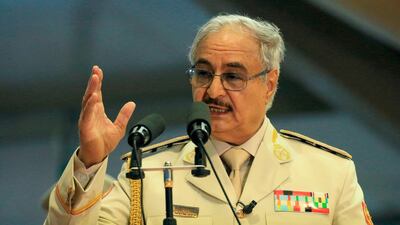UN Secretary General Antonio Guterres left Libya on Friday saying he hoped it would be possible to avert a “bloody confrontation” in and around the capital Tripoli upon which the country's most powerful military force is advancing.
His comments came after the UAE, United States, France, Britain and Italy called for de-escalation in Libya barely a week before UN-sponsored talks on a political solution are due to start.
Mr Guterres, who was in Tripoli when the Libyan National Army began a sudden offensive, spoke after meeting its leader, Field Marshal Khalifa Haftar, in the eastern city base of Benghazi.
“I leave Libya with a deep concern and a heavy heart,” said the UN secretary general, stressing the need for the country's rival factions to unify.
“The United Nations remains available to facilitate any political solution,” he added.
Mr Guterres's spokesman in New York later refused to comment when asked if Mr Haftar had been asked to halt his offensive.

The UN Security Council discussed the situation on Friday in a closed-door emergency meeting.
"They (the council) called on LNA forces to halt all military movements," said German UN Ambassador Christoph Heusgen, president of the council for April, reading a statement agreed by the body.
"They also called on all forces to de-escalate and halt military activity. There can be no military solution to the conflict," he said.
Speaking before the security council consultations began, Jonathan Allen, Britain's deputy permanent representative to the UN, urged General Haftar's army to "withdraw to its previous position".
The G7 foreign ministers called on all involved parties to halt any move on the capital.
Mr Haftar's order to his forces to seize Tripoli has alarmed the UN and countries trying to mediate between the Tripoli-based Government of National Accord (GNA) and a rival administration allied with the LNA.
Late on Friday, a spokesman for the LNA claimed its forces had seized the disused Tripoli International Airport on the southern suburbs of the capital. This was quickly countered by pro-GNA forces who rebuffed the LNA's statements though appearing to say that, at least to some degree, Mr Haftar's forces entered the airport before being pushed back.
On Friday, militias in western Libya said they would counter the push by Mr Haftar's forces, raising fears of renewed civil war. The militias from the cities of Zawiya and Misrata, which support the Tripoli government, said on social media that they would confront the LNA.
"We are the revolutionaries and the elders ... we declare we are on full mobilisation and war," they said.
The Zawiya forces said they recaptured a base taken by Mr Haftar's forces about 30 kilometres from Tripoli.
In a joint statement released by the US State Department on Thursday, the UAE, United States, Britain, France and Italy said they were deeply concerned by clashes near Tripoli.
"Our governments oppose any military action in Libya and will hold accountable any Libyan faction that precipitates further civil conflict," they said.
"At this sensitive moment in Libya's transition, military posturing and threats of unilateral action only risk propelling Libya back toward chaos.”
A UN-sponsored national conference to discuss steps towards holding national elections is due to take place in Libya between April 14-16. It is the latest internationally-backed effort to end years of turmoil following the overthrow and killing of dictator Muammar Qaddafi in a Nato-backed uprising in 2011.
Russia said on Friday that it hoped the crisis would not lead to "renewed bloodshed", and added that Moscow did not support Mr Haftar.
Libya's neighbour Egypt also expressed "deep concern" over the outbreak of fighting.
Witnesses say the LNA appears to be moving towards Tripoli along the coastal highway from eastern Libya, and from south-west Libya.
The south-west force was engaged in clashes on Wednesday at Asabiah, about 110 kilometres south of the capital, with one person killed.
On Thursday, the LNA said its troops had peacefully taken control of Gharyan, a city 90 kilometres south of the capital.
Mr Haftar's forces launched their offensive as the UN secretary general arrived in Tripoli to prepare for the talks between Libya's various factions and political leaders in the western city of Ghadames later this month.
Mr Guterres has repeatedly said that there is no military solution for the problems in Libya, calling for political dialogue.
The UN chief also described how he had been “moved and shocked” after visiting a detention centre for refugees and migrants.
Libya became the main launching point for migrants trying to reach Europe across the Mediterranean as people smugglers took advantage of the chaos in the country. European states tried to stem the flow by helping the Tripoli government to strengthen its coast guard and to set up migrant holding centres.

